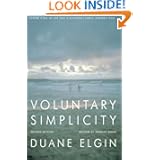Richard Gregg paraphrasing a teaching of Mahatma Gandhi (1936)

here

About 5-ish years ago we decided to get local with our food and as many other purchases as we could. It has been an interesting ride. Voluntary Simplicity seemed easy in relation to these two choices. (click here to read other posts, voluntary simplicity, )
But what is Voluntary Simplicity? Voluntary of course means that there is a choice about lifestyle. It means there is a conscious attempt to make a change. Simplicity is a testimony for Quakers and other groups. There are a gazillion responses to this query. I think what it boils down to is to live below your means, to be involved with local community, to be aware, to give, to avoid waste in as many ways as possible, to be resilient.
Common misconceptions include; simplicity means poverty, rural living, ugly living, and/or economic stagnation. "These stereotypes make simpler life seem impractical and unapproachable and thereby reinforce the feeling that nothing can be done to respond to our critical world situation." Elgin.
Elgin participated in the "Voluntary Simplicity Survey" I don't know about it's statistical validity. It seems sound, but then who knows with statistics. What is interesting is that voluntary simplicity is rarely a path chosen by those who began life in poverty, who are from a non-white background,or have slightly lower than middle incomes. It also shows that this path is across geographies, largely urban, involves people with higher education (it doesn't state where higher begins), and most people had been engaged for 6 or more years. It doesn't seem to be a fad, also given the book is 32 years old. I wonder what the survey results would look like now?
Lately, it also means to discern if you are being tricked into thinking you are buying a simple/sustainable option. Carbon offsetting is a game. Dual engines are a scam. Simple living style magazines are a definite pander. Don't get me started on organic cotton or bamboo fibres. Look at it! What processes are going into things. (ooops, bit of rant that last bit)
Resilience is a term being included in critical thinking about sustainable practices. In other words, if a thing can't happen because you have simplified to the point of excluding something, is this a right practice? If your parent needs weekly visits to the doctors, you gave up all the cars, but taxis frighten your parent, then is this a good choice? Maybe you still need a car once a week? If you decide to bike everywhere, but it snows in your area a lot, then what is plan B? If you only buy organic clothes, is sweat labour involved? In other words, go below the surface. It might turn out that one choice means injustice for another. Discern. Then, whatever choice you make in your food, transportation, clothes, entertainment etc. is informed, cautious, and repeatable.
In preparing this blog, I found it interesting that my most careful photographs came from my textile work or from trips to the country side. I have read a completely different book about Nature in urban settings. I smell a challenge to find pattern and serenity inside city limits.
I'll look at "Common Expressions of Simpler Ways of Living" by Elgin next post.



No comments:
Post a Comment